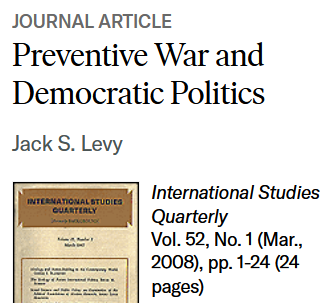
Paul Poast@ProfPaulPoast
Mar 10, 2021
65 tweets
Why did the US invade Iraq in 2003?
Retaliation for 9/11? A demonstration of US power? Saddam Hussein was a threat? Bush had a personal vendetta to settle? A mistake? All of the above?
The reality is that we don't know.
[THREAD]
This thread is partly motivated by what @Dr. Dani Gilbert recently observed
twitter.com/_danigilbert/s

Dr. Dani Gilbert@_danigilbert
Mar 07 21
View on Twitter
I am downright floored by how many of my students believe that the U.S. invaded Iraq as retaliation for 9/11.
To start, let's give some background and review the war's lead-up.
Following the end of the 1991 Persian-Gulf War, the UN Security Council had authorized the imposition of no-fly zones...
digitallibrary.un.org/record/110659?
...and economic sanctions against Iraq (largely aimed at cutting off oil sales)
un.org/Depts/unmovic/
Goals of the policy were (1) to prevent Saddam Hussein from developing a nuclear weapons program, (2) prevent him from attacking his neighbors, & (3) protect the Kurds in northern Iraq.
By the early 2000s, there emerged a dispute between France and the United States over whether to continue "containment".
This @The Atlantic article from back in 2003 nicely lays out the issues as they were understood in the public at the time
theatlantic.com/politics/archi
France wanted to end containment.
brookings.edu/articles/frenc
For France, ending containment was sensible since (1) Iraq was weak, (2) UN inspections could continue and confirm whether Iraq had WMD/nuclear program  ....
cnn.com/2003/US/03/07/
....
cnn.com/2003/US/03/07/
 ....
cnn.com/2003/US/03/07/
....
cnn.com/2003/US/03/07/ ...and (3) the sanctions were doing more harm than good  tandfonline.com/doi/abs/10.108
tandfonline.com/doi/abs/10.108
 tandfonline.com/doi/abs/10.108
tandfonline.com/doi/abs/10.108For USA, ending containment posed risks:
(1)  had more "special relationships" in the region (
had more "special relationships" in the region ( &
&  , not to mention
, not to mention  )
(2)
)
(2)  under Saddam had invaded
under Saddam had invaded  , invaded
, invaded  , threatened
, threatened  , and fired missiles at
, and fired missiles at  (3) Worth also keeping in mind that
(3) Worth also keeping in mind that  &
& monitored no-fly zones
monitored no-fly zones
 had more "special relationships" in the region (
had more "special relationships" in the region ( &
&  , not to mention
, not to mention  )
(2)
)
(2)  under Saddam had invaded
under Saddam had invaded  , invaded
, invaded  , threatened
, threatened  , and fired missiles at
, and fired missiles at  (3) Worth also keeping in mind that
(3) Worth also keeping in mind that  &
& monitored no-fly zones
monitored no-fly zonesThe Bush administration argued that the alternative to containment was invasion, and Congress approved in October of 2002
nytimes.com/2002/10/11/us/
That led the Bush administration to "make their case" before the UN Security Council.
theguardian.com/world/2003/feb
France, opposed. They viewed using force as setting a bad precedent and, hence, threatened to veto any UNSC resolution seeking to authorize the use of force.
c-span.org/video/?c450663
Indeed, French Foreign Minister Villepin made the case against the use of force numerous times in the @United Nations SC:
carnegieendowment.org/2004/02/24/fre
Given that France could veto any US attempt to gain UNSC authorization, the US abandoned the effort to gain UN approval.
voanews.com/archive/bush-o
Then Bush issued his ultimatum and the invasion began two days later.
youtube.com/watch?v=bkzZfv
Having given this background, the key question becomes: why invasion? Why was the Bush administration so keen on invasion as the alternative to containment?
That is where the IR scholarship comes in!
Explanation 1: The 9/11 connection.
The Bush administration did a lot publicly to link 9/11 to the threat posed by Saddam Hussein
jstor.org/stable/3689022
This meant the public was "primed" to go along with the war due to a need for revenge, as explored by @Linda J. Skitka & Peter Lieberman in Public Opinion Quarterly
academic.oup.com/poq/article/81
In particular, Bush was concerned about preventing threats BEFORE they attacked. Hence, invading Iraq had a "preventive war" element. In his 2008 ISA presidential address, Jack Levy discussed the role of preventive logic in the Iraq war
jstor.org/stable/2973422
This is consistent with @Mike Mazarr's recent account, arguing that the need to protect America from "another 9/11" took on almost missionary zeal with Bush
amazon.com/Leap-Faith-Neg
As @Patrick Porter lays out in this @International Politics journal piece, invading Iraq & establishing a democracy was seen as a way of undermining the "Delta of Terrorism"
link.springer.com/article/10.105
Porter is arguing against Dan Deudney & John Ikenberry, who wrote in @Survival: Global Politics and Strategy that "the primary objective of the war was the preservation and extension of American primacy in a region with high importance to American national interests"
tandfonline.com/doi/full/10.10
Explanation 2: invading Iraq was a demonstration of US dominance (this is a variant of the Deudney and Ikenberry argument).
@Ahsan Butt in @Security Studies describes the Iraq War as a “performative war”, done to demonstrate American willingness to use force to suppress challenges to its authority. Such a demonstration became imperative following the "humiliation" of 9/11
tandfonline.com/doi/abs/10.108
Explanation 3: Containment was unsustainable
At the time invading Iraq became percieved as less costly than maintaining containment (with sanctions and the low-level fighting es), as argued by Andrew Coe in @Journal of Politics @jop@sciences.social.
journals.uchicago.edu/doi/abs/10.108
Indeed, as @Malfrid recently argued in in @International Security, containment was simply unsustainable due to making it impossible for Iraq to credibly signal that it did NOT have (or wish to pursue) WMD
mitpressjournals.org/doi/full/10.11
This touches on the "dual dilemma" of reassurance (towards USA) and deterrence (towards Iran) that Saddam faced. This is debated by David Lake and @Michael McKoy in @International Security
mitpressjournals.org/doi/pdfplus/10
Explanation 4: Regime Change was Always US Policy
It was only a matter of time before US invaded Iraq to remove Saddam. Harvey argues that the invasion of Iraq would have taken place regardless of who won the Presidency in 2000 (Bush or Gore) because he was a problem that eventually had to be replaced.
amazon.com/Explaining-Ira
The main points of Harvey's argument are illustrated well in this presentation
youtube.com/watch?v=MxZyV5
Explanation 5: Munich Analogy
Related to the "matter of time" argument, Jon Finer's @Foreign Affairs review of "The U.S. Army in the Iraq War" connects the eventual invasion decision to the "Munich Analogy" and remorse for not "finishing the job" in 1991
foreignaffairs.com/reviews/review
What to conclude? What all of these works show is that the actual decision for war eludes us.
That's because, as @Robert Draper argues in his recent account, the ultimate decision was George W Bush's and it's still not clear exactly what ultimately made up his mind (and when
amazon.com/Start-War-Bush
The best we have is the post-hoc justifications that he offers in his memoirs
amazon.com/Decision-Point
We might eventually know (when more archives open), but, like the origins of the Vietnam War, it will likely continue to be debated without resolution.
[END]
Addendum 1: What exactly did Bush say in his memoir? From my read, it seems that he bought into a sixth explanation (which combines #1 & #2): setting an example to prevent nuclear proliferation (in particular, to prevent  from pursuing the bomb).
from pursuing the bomb).
 from pursuing the bomb).
from pursuing the bomb).By mid-August of 2002, it was confirmed to Bush that Iran had a nuclear program (as Bush describes, page 415, of his memoir)
The "Axis of evil" remark is referring to his 2002 State of the Union address
youtube.com/watch?v=btkJhA
During that speech, he made the following remark
But Bush apparently had two reasons to NOT attack Iran:
1) it appears that Bush found the "budding freedom movement" in Iran encouraging
2) It's very likely that Iraq was viewed as the "easier" target. Here is Bush describing what Colin Powell said to him about invading Iraq
Again, we must be careful making inferences from a memoir. Still, Bush's post-hoc rationalization shouldn't be completely dismissed.
Addendum 2: Some additional pieces that elaborate on each of the five explanations given above
For more on explanation 1, namely the linking of the war to 9/11 and the need to prevent threats, see this @Presidential Studies Quarterly paper by @Babak Bahador, @Jeremy Moses, & @William Lafi Youmans. Shows how the given reason changed strategically.
onlinelibrary.wiley.com/doi/abs/10.111
Similarly, see chapter 6 in @Jack Holland's book "Selling the War on Terror"
google.co.uk/books/edition/
For more on the liberal-realist debate (which covers explanation 1 and 2), see this edited volume chapter by @Nicholas Kitchen & Michael Cox
researchgate.net/publication/29
For more on explanation 3, the unsustainability of containment (namely, how it was likely doomed from the beginning) & explanation 5, the failure to finish the job in '91, see this recent @Texas NatSec Review piece by Samuel Helfont
tnsr.org/2021/02/the-gu
For more on Explanation 4, that the idea that pursuing regime change was a long held US foreign policy establishment view, see this @Security Studies piece by @Windy City #Fella
tandfonline.com/doi/full/10.10
For more on Explanation 5, that there was a need to eventually "finish the job" and not allow the problem of Saddam to "fester", see @Konstantinos Travlos PhD & @Cyber Thunder Run in @Duck of Minerva, where they discuss how the US-Iraq "rivalry" created dynamics that led to war
duckofminerva.com/2013/03/the-us
Relatedly, to further understand how the long-standing US-Iraq rivalry drove US military strategy (to focus on quickly responding against small powers, rather than engage in a permanent standoff against a great power) see @Steve Metz's book
amazon.com/Iraq-Evolution
Addendum 3: If you care to explore some of the available documents yourself, I recommend the following...
The Chilchot Report. While it focuses on the British perspective, lots of insights into what US officials were saying (and thinking)
webarchive.nationalarchives.gov.uk/20171123122743
The @NatlSecurityArchive "Iraq Project". Lots of resources (which, admittedly, could be used to support any one of the above explanations)
nsarchive.gwu.edu/project/iraq-p
As for memoirs, be cautious
jstor.org/stable/2354052
Addendum 4: For a comparative perspective on the decision to invade Iraq (i.e. context with overall US foreign policy & politics), several good works include...
...Florian Boller in Democracy and Security article on the decision of congress to authorize interventions...
tandfonline.com/doi/abs/10.108
...@Jason Davidson (he/him) book on whether and when US allies will support interventions...
palgrave.com/gp/book/978023
... Beate Jahn's article on how a US policy towards intervention is rooted in liberal diplomacy (read "Liberal International Order")...
tandfonline.com/doi/abs/10.108
...Andrew Bacevich (@Quincy Institute) on how the Iraq War fits in American society...
amazon.com/dp/B00BTFG8KQ/
...@Tom Nichols on the Iraq War as part of a trend toward pursuing "preventive wars"
amazon.com/Eve-Destructio

Paul Poast
@ProfPaulPoast
Tweeting to teach. International Relations scholarship and Foreign Policy. @UChicago Prof. @ChicagoCouncil Fellow. @WPReview Columnist.
Missing some tweets in this thread? Or failed to load images or videos? You can try to .



































